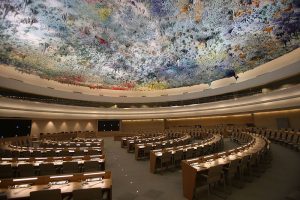by Rosa Freedman, School of Law, University of Reading
Vitit Muntarbhorn, the UN’s first Independent Expert on protection against violence and discrimination based on sexual orientation and gender identity, has resigned after a just year in his post, citing ill health and caring responsibilities. Before stepping down, he will deliver his second and final report. This is just the latest development in a long-running UN battle over LGBT rights – and it could herald a new attempt to undermine international efforts to protect and promote the fundamental human rights of LGBT individuals.
All people hold certain fundamental rights by virtue of being born human. These include not being tortured, arbitrarily detained, or discriminated against based on “protected characteristics” such as race, religion, gender, or sexual orientation and gender identity. That last category might be obvious to many of us, but it is not accepted by the more than 70 states that criminalise and discriminate against LGBT people or acts, and those countries have constantly fought against any attempt to discuss, report on, or create specific international mechanisms to protect those individuals from having their fundamental rights violated.
The main battleground in this fight is the UN’s main human rights body, the Human Rights Council. In 2011, the Council held its first discussions on protecting LGBT people from human rights abuses – and all the Islamic countries at the Council, other than Algeria, walked out of the council chamber during the panel discussion.
In the years that followed, those countries opposing the notion that LGBT people require specific protection of their fundamental rights tried to provide cover for abusing their rights by advancing notions of “traditional values” and “rights of the family”. But despite their best efforts to block the path, in June 2016 the Human Rights Council created Muntarbhorn’s post, a mechanism set up specifically to report on two violations of fundamental rights of sexual orientation and gender identity minorities: violence and discrimination.
This process amounted to one of the most polarised discussions and votes in the Council’s decade-long history.
Step forward, step back
In the vote on setting up the Independent Expert role, all European Union and Latin American members of the council voted in favour; all African countries voted against or abstained, and all Islamic countries other than Albania voted against. So did China and Russia. The countries voting no then tried to overturn the council’s resolution at the UN General Assembly. They ultimately failed, but only after significant diplomatic efforts and civil society campaigns.
When it finally came, Muntarbhorn’s appointment was heralded as a great victory in an ongoing struggle. An Independent Expert can request to visit any country in the world to investigate, report on, and make recommendations about human rights related to their mandates. They may also receive communications from victims of human rights abuses, civil society, or others, and may transmit complaints to the relevant state or government. They also produce reports that go into issues in depth, often providing innovative analysis and new approaches to protecting and promoting rights within their mandate.
Muntarbhorn’s first report clearly signalled his plans for his tenure. He set out in detail the mandate, the methodology for protecting people from violence and discrimination, and his initial priorities: the decriminalisation of consensual same-sex relations, effective anti-discrimination measures, legal recognition of gender identity, destigmatisation, sociocultural inclusion, and the promotion of education and empathy. His second report focuses on the first two areas – but sadly, with his resignation, he will not be able to take that work forward.
And so now the UN is left with the job of appointing his successor. It’s very unusual for a mandate-holder to step down so quickly, and other Special Procedures mandate-holders have in the past been subjected to attacks, threats of violence, and intimidation.
It’s certainly possible that Muntarbhorn’s short tenure was made difficult behind the scenes by states or private actors who opposed the creation of his job from the off. Just the possibility of such pressure might be enough to deter other human rights experts from stepping up to take on the mandate. So long as the mandate is vacant those states who’d still like to stop it being taken forward at all will have a chance to disrupt the appointment process and the work of the eventual appointee.
Given what has come before, those interested in protecting LGBT people from violence and discrimination should roll up their sleeves and prepare for another round in this fight.
Rosa Freedman, Professor of Law, Conflict and Global Development, University of Reading
This article was originally published on The Conversation. Read the original article.

